|
|
|
Sort Order |
|
|
|
Items / Page
|
|
|
|
|
|
|
| Srl | Item |
| 1 |
ID:
133275
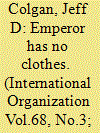

|
|
|
|
|
| Publication |
2014.
|
| Summary/Abstract |
Scholars have long debated the causal impact of international institutions such as the World Trade Organization or the International Monetary Fund. This study investigates Organization of Petroleum Exporting Countries (OPEC), an organization that purports to have significant influence over the market for the world's most important commodity-petroleum. Using four empirical tests, I find that OPEC has little or no impact on its members' production levels. These findings prompt the question of why so many people, including scholars, believe in OPEC's influence over the world's oil supply. The idea of OPEC as a cartel is a "rational myth" that supports the organization's true principal function, which is to generate political benefits for its members. One benefit it generates is international prestige. I test this idea using data on diplomatic representation and find that OPEC membership is associated with increased international recognition by other states. Overall, these findings help one to better understand international regimes and the process of ideational change in world politics.
|
|
|
|
|
|
|
|
|
|
|
|
|
|
|
|
| 2 |
ID:
133276
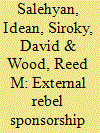

|
|
|
|
|
| Publication |
2014.
|
| Summary/Abstract |
Although some rebel groups work hard to foster collaborative ties with civilians, others engage in egregious abuses and war crimes. We argue that foreign state funding for rebel organizations greatly reduces incentives to "win the hearts and minds" of civilians because it diminishes the need to collect resources from the population. However, unlike other lucrative resources, foreign funding of rebel groups must be understood in principal-agent terms. Some external principals-namely, democracies and states with strong human rights lobbies-are more concerned with atrocities in the conflict zone than others. Multiple state principals also lead to abuse because no single state can effectively restrain the organization. We test these conjectures with new data on foreign support for rebel groups and data on one-sided violence against civilians. Most notably, we find strong evidence that principal characteristics help influence agent actions.
|
|
|
|
|
|
|
|
|
|
|
|
|
|
|
|
| 3 |
ID:
133272
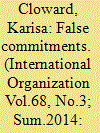

|
|
|
|
|
| Publication |
2014.
|
| Summary/Abstract |
A substantial international relations literature addresses the various ways in which international actors, and the norms they promote, influence state behavior. But less attention has been paid to the influence these actors directly exert at the local level, despite the fact that many transnational campaigns promote norms for which individuals-not states-are the primary transgressors. If individuals behave as some states do, publicly embracing international norms only because they expect a financial or reputational benefit from doing so, then the campaigns have not fully succeeded. But when do individuals engage in real behavior change, and when do they simply change the public image they present to the international community? To begin to address this question, I employ a randomized field experiment to evaluate individuals' willingness to make claims that differ from their true normative commitments. I conducted the experiment in the context of an original 2008 opinion survey about female genital mutilation and early marriage, run in rural Kenya. I find that respondents misrepresent their behavior and intentions, and I supplement these findings with an exploration of causal mechanisms through qualitative interviews.
|
|
|
|
|
|
|
|
|
|
|
|
|
|
|
|
| 4 |
ID:
133274
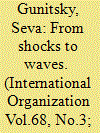

|
|
|
|
|
| Publication |
2014.
|
| Summary/Abstract |
What causes democratic waves? This article puts forward a theory of institutional waves that focuses on the effects of systemic transformations. It argues that abrupt shifts in the distribution of power among leading states create unique and powerful incentives for sweeping domestic reforms. A variety of statistical tests reveals strong support for the idea that shifts in hegemonic power have shaped waves of democracy, fascism, and communism in the twentieth century, independent of domestic factors or horizontal diffusion. These "hegemonic shocks" produce windows of opportunity for external regime imposition, enable rising powers to rapidly expand networks of trade and patronage, and inspire imitators by credibly revealing hidden information about relative regime effectiveness to foreign audiences. I outline these mechanisms of coercion, influence, and emulation that connect shocks to waves, empirically test their relationship, and illustrate the theory with two case studies-the wave of democratic transitions after World War I, and the fascist wave of the late interwar period. In sum, democracy in the twentieth century cannot be fully understood without examining the effects of hegemonic shocks
|
|
|
|
|
|
|
|
|
|
|
|
|
|
|
|
| 5 |
ID:
133273
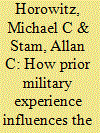

|
|
|
|
|
| Publication |
2014.
|
| Summary/Abstract |
Policy-makers and the electorate assume political executives' life experiences affect their policy choices once in office. Recent international relations work on leaders focuses almost entirely on how political institutions shape leaders' choices rather than on leaders' personal attributes and how they influence policy choices. This article focuses the analytic lens on leaders and their personal backgrounds. We theorize that the prior military background of a leader is an important life experience with direct relevance for how leaders evaluate the utility of using military force. We test several propositions employing a new data set, building on Archigos, that encompasses the life background characteristics of more than 2,500 heads of state from 1875 to 2004. The results show that the leaders most likely to initiate militarized disputes and wars are those with prior military service but no combat experience, as well as former rebels.
|
|
|
|
|
|
|
|
|
|
|
|
|
|
|
|
| 6 |
ID:
133279
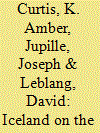

|
|
|
|
|
| Publication |
2014.
|
| Summary/Abstract |
We undertake an individual-level analysis of mass political behavior toward sovereign debt resettlement by leveraging the unique circumstances of a 2011 referendum on debt repayment in Iceland. This allows us to engage broader questions about mass international political economy. Against the recent thrust of a growing literature, we find evidence of material economic "pocketbook" effects-self-interest-on voting behavior, operating alongside symbolic/sociotropic and partisan/political logics. Contrary to expectations, these self-interest effects are not conditional on voter sophistication. We conclude that conventional sampling frames may be inappropriate for understanding contemporary democratic contestation over international economic policy.
|
|
|
|
|
|
|
|
|
|
|
|
|
|
|
|
| 7 |
ID:
133278
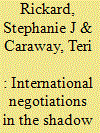

|
|
|
|
|
| Publication |
2014.
|
| Summary/Abstract |
This study examines the role elections play in negotiations between states and the International Monetary Fund (IMF). Although loans made by the IMF often require countries to introduce painful austerity measures that provoke a backlash from angry citizens, some governments are able to negotiate more favorable terms than others. Original data on the substantive content of IMF loans show that governments leverage imminent elections to obtain more lenient loan terms. Conditions that require labor market reforms in exchange for IMF financing are relatively less stringent in loans negotiated within six months before a pending democratic election, all else equal. The further away elections are from loan negotiations, the more stringent the labor conditions included in countries' loan programs. Elections give governments leverage in their international negotiations and this leverage is effective even when states negotiate with unelected bureaucrats during times of economic crisis.
|
|
|
|
|
|
|
|
|
|
|
|
|
|
|
|
| 8 |
ID:
133277
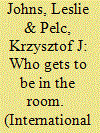

|
|
|
|
|
| Publication |
2014.
|
| Summary/Abstract |
Third parties complicate World Trade Organization (WTO) dispute settlement by adding voices and issues to a dispute. However, complainants can limit third parties by filing cases under Article XXIII of the General Agreement on Tariffs and Trade (GATT), rather than Article XXII. We argue that third parties create "insurance" by lowering the benefit of winning and the cost of losing a dispute. We construct a formal model in which third parties make settlement less likely. The weaker the complainant's case, the more likely the complainant is to promote third party participation and to settle. Article XXII cases are therefore more likely to settle, controlling for the realized number of third parties, and a complainant who files under Article XXIII is more likely to win a ruling and less likely to see that ruling appealed by the defendant. We provide empirical support using WTO disputes from 1995 to 2011.
|
|
|
|
|
|
|
|
|
|
|
|
|
|
|
|
|
|
|
|
|